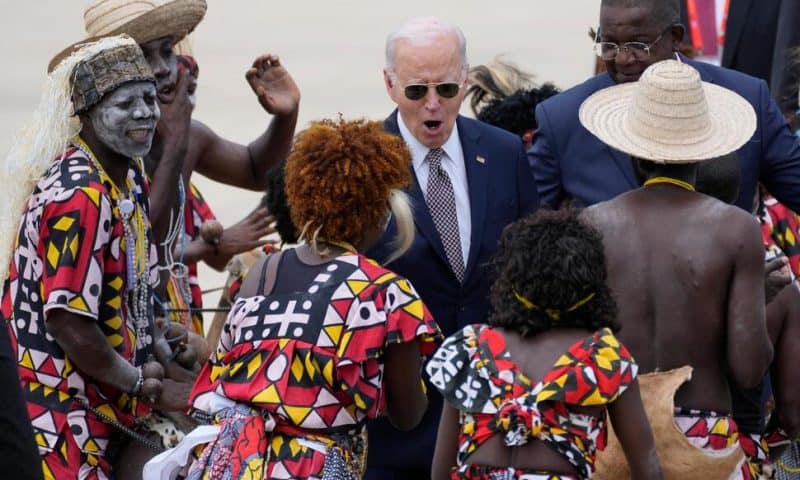President Joe Biden has pledged another $600 million for an ambitious multi-country rail project in Africa as one of the final foreign policy moves of his administration
LOBITO, Angola — President Joe Biden pledged another $600 million Wednesday for an ambitious multi-country rail project in Africa as one of the final foreign policy moves of his administration, and told African leaders the resource-rich continent of more than 1.4 billion people had been “left behind for much too long.”
“But not anymore,” Biden added. “Africa is the future.”
Biden used the third and final day of a visit to Angola — his long-awaited first trip to sub-Saharan Africa as president — to travel to the coastal city of Lobito and tour an Atlantic port terminal that’s part of the Lobito Corridor railway redevelopment.
Biden described it as the largest U.S. investment in a train project outside America. The U.S. and allies are investing heavily in the project that will refurbish nearly 2,000 kilometers (1,200 miles) of train lines connecting to the mineral-rich areas of Congo and Zambia in central Africa.
The corridor, which likely will take years to complete, gives the U.S. better access to cobalt, copper and other critical minerals in Congo and Zambia that are used in batteries for electric vehicles, electronic devices and clean energy technologies that Biden said would power the future.
China is dominant in mining in Congo and Zambia. The U.S. investment has strategic implications for U.S.-China economic competition, which went up a notch this week as they traded blows over access to key materials and technologies.
The African leaders who met with Biden on Wednesday said the railway corridor offered their countries a much faster route for minerals and goods — and a convenient outlet to Western markets.
“This is a project that is full of hope for our countries and our region,” said Congo President Félix Tshisekedi, whose country has more than 70% of the word’s cobalt. “This is not just a logistical project. It is a driving force for economic and social transformation for millions of our people.”
The leaders said the corridor should spur private-sector investment and improve a myriad of related areas like roads, communication networks, agriculture and clean energy technologies.
For the African countries, it could create a wave of new jobs for a burgeoning young population.
“It’s a huge, huge opportunity,” said Zambian President Hakainde Hichilema. “It’s good for Africa.”
Cargo that once took 45 days to get to the U.S. — usually involving trucks via South Africa — would now take around 45 hours, Biden said. He predicted the project could transform the region from a food importer to exporter.
It’s “something that if done right will outlast all of us and keep delivering for our people for generations to come,” he said.
The announcement of an additional $600 million took the U.S.’s investment in the Lobito Corridor to $4 billion. The corridor has drawn financing from others including the European Union, the Group of Seven leading industrialized nations, a Western-led private consortium and African banks. Biden said the total investment was $6 billion.
Some calling for more U.S. involvement in Africa hope it will mark a new era of U.S.-Africa engagement.
Much of that depends on the administration of Donald Trump, who takes office Jan. 20. The White House says Republicans in Congress have supported past efforts to promote African business interests through targeted investments and that such initiatives have appealed to Trump in the past.
Trump also supports measures to counter China, and some see the Lobito Corridor as a direct counter to the Belt and Road Initiative infrastructure strategy that China has used to promote its economic and political influence in Africa and elsewhere.
A senior U.S. administration official called the Lobito Corridor the heart of competing with China not as a political adversary but from a business standpoint by sparking investment and helping countries over the long term.
The U.S. is looking to replicate the Lobito Corridor project in other parts of the world, said the official, who briefed reporters on condition of anonymity to offer details that hadn’t yet been made public.
Biden had promised to visit sub-Saharan Africa last year but the trip was delayed. He was greeted Monday by thousands of Angolans on the streets of the capital, Luanda.
Angola has long and strong ties to China, and the Biden administration’s ability to win it over as a partner for such a major project has been viewed as a rare success for the U.S. in Africa.
Biden, who has about six weeks left in office, said he would like to come back to see the railway’s progress. “I want to come back and ride the whole thing,” he told the African leaders, before departing.

